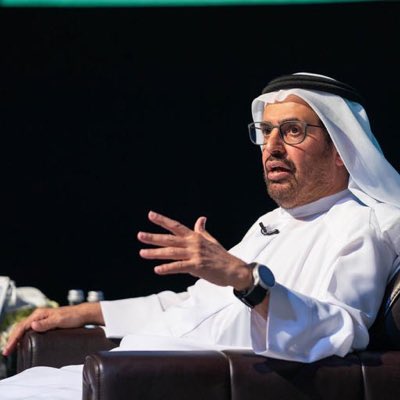
Dr. Ali Al Nuaimi, chairman of Defense, Interior and Foreign Affairs Committee at the UAE Federal National Council, in a special interview marking the one-year anniversary of the Abraham Accords.
(August 12, 2021 / Israel Hayom) As chairman of the Defense, Interior and Foreign Affairs Committee at the United Arab Emirates Federal National Council, Dr. Ali Al Nuaimi serves as a kind of senior adviser in the Arab Gulf state.
He recently sat down for an interview to share his views, which reflect those of the palace in the Gulf state.
Q: One year after the signing of the Abraham Accords, are the Emirates pleased with the results?

Q: What do people in the Emirates think about Israel re-examining the deal to transfer natural gas from the UAE to Europe via Israel?
A: Understand, the ties being forged between us are not political or just between governments. These are comprehensive ties in every respect. This is a normal relationship, that is growing. Clearly, there will sometimes be difficulties and differences, but that doesn’t mean you go back whenever there is conflict. We aren’t going back, no matter what. There is discussion and dialogue, and I know the media will paint it as a crisis. But it isn’t. This is one issue, and in the end, I am sure we will reach an agreement. But I don’t want our Israeli friends to think that a disagreement on one issue will degrade ties. This is not the case.
Q: How do you view the events of the last week, in which two ships came under attack in your area and Israel was targeted by rocket fire from Lebanon?
A: The international community must enforce international law so that there is security and stability in the region. These actions were taken all over the region by the [Iranian Islamic] Revolution Guards and organizations under their auspices. This is a violation of international law. The Israelis conducted themselves wisely when they contacted the United States, Britain and other countries and tasked those governments with the responsibility to act. This is not the responsibility of the Israelis, but the world.
Q: How should Iran, which threatens both our countries, be treated, particularly when a new president has just entered office there?
A: The problem is that the international community does not speak in one voice on Iran. When we speak with our European friends about the invasiveness and aggression of Iran in Arab states, we hear that they “understand our concerns.” But we don’t need someone to understand our concerns, rather we need someone to act according to international law and respond to those violating other countries’ sovereignty.
Q: What do the Emirates think of U.S. intentions of returning to the nuclear deal?
A: We have a clear history. The Iranians have never honored the agreement or the commitments, in any respect. They want to be a world power and violated the law in Europe when, in many cases, they supported terrorist activity. So, to return to that accord as is won’t solve the problem.
Q: For years, you have sounded the alarm on the Muslim Brotherhood. Why do you believe they are a problem?
A: The Muslim Brotherhood hijacked Islam. They use religion to promote political objectives. Organizations like Al-Qaeda, Boko Haram, Islamic State and others have ties to the Muslim Brotherhood. But that is not Islam, and it does not serve the interests of the world’s Muslims. Instead of religion uniting all people, they have developed a narrative of hate.
Q: Is it a mistake for the Israeli government to include a party that in practice belongs to the Muslim Brotherhood?
A: No. Every country has its own priorities. But I am confident that they joined after accepting that they are Israeli citizens and have sworn to serve their country, and that is a step in the right direction.
Q: What do you see happening with Israel-UAE ties over the next year?
A: I see progress. We already have the first students from the Emirates studying in Israel, and after the coronavirus restrictions are removed, there will be additional cooperation. It may not happen in the coming months, but I am certain more countries will take part.
This article first appeared in Israel Hayom.